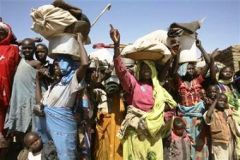UN to discuss protection force for Darfur refugees
September 23, 2007 (PARIS) — France will chair a UN Security Council meeting Tuesday aiming to hasten the deployment of a UN-European Union force to the Central African Republic and Chad that would protect civilian victims of the conflict in neighboring Darfur.
 The discussions will take place as part of a meeting dedicated to African security on the margins of the 62nd General Assembly.
The discussions will take place as part of a meeting dedicated to African security on the margins of the 62nd General Assembly.
It will be only the third time Security Council members have met at the level of head of state or government.
UN Secretary General Ban Ki-moon and African Union Commission chief Alpha Oumar Konare are also set to attend the meeting.
In announcing the initiative, last month, French President Nicolas Sarkozy pledged that his country would, now, be “fully involved” in Darfur peace efforts.
He spoke of the “tragic” situation that had been unfolding in the western Sudanese region for more-than-four years.
The UN Security Council meeting is likely to be dominated by Darfur.
“It will be about accelerating the negotiations on the deployment of an international presence in eastern Chad and the northeast of the Central African Republic. That is a necessity,” Elysee palace spokesman David Martinon said Thursday.
France had submitted a draft resolution Wednesday to the Security Council that would approve the deployment of mixed UN-EU forces to the two countries.
Under the latest draft, 300 UN policemen would be tasked with monitoring camps for Darfur refugees and the internally displaced, which number, respectively, 236,000 and 173,000 in Chad, alone, according to the UN.
The UN police officers would be protected by 3,000 European troops, mostly French, under a British general.
“This force has a humanitarian mission, but should also help bring stability to the whole of the region,” said one official familiar with the plan. “The idea is to begin deployment in October-November, in conjunction with the hybrid UN-AU force for Darfur.”
Sudanese President Omar Al Bashir had long opposed the deployment of UN troops in Darfur.
It was only in July that the Security Council approved a 26,000-strong UN force to take over peacekeeping in the region from 7,000 ill-equipped African Union troops.
The deployment of the UN-AU force is unlikely to be completed before mid-2008.
Non-governmental organizations generally applauded France’s efforts to get the humanitarian mission underway, but some suspect France of having a hidden agenda in the deployment to two former colonies.
“The idea can only be saluted. For a long time we’ve been calling for an intervention in the region,” said Fabrice Tarrit, the head of Survie, an association that works to end France’s support of corrupt and undemocratic regimes in Africa.
“But France is not the best placed to play peacemaker, because, historically, it has contributed more to war than peace on the continent,” he added.
Jacky Mamou, president of Urgence Darfour, a group uniting dozens of French NGOs and hundreds of individuals, said “one must do all to avoid the arrival of the force being perceived as an operation to stabilize the Chadian regime.”
According to UN estimates, more than 200,000 people have died and some 2 million have been displaced in Darfur, as a result of the combined effect of war and famine since the conflict erupted more-than-four years ago.
On Friday, participants at a UN-sponsored high-level meeting urged all Darfur rebel groups to attend crucial peace talks with Khartoum scheduled in Libya next month or face sanctions.
(AFP)
